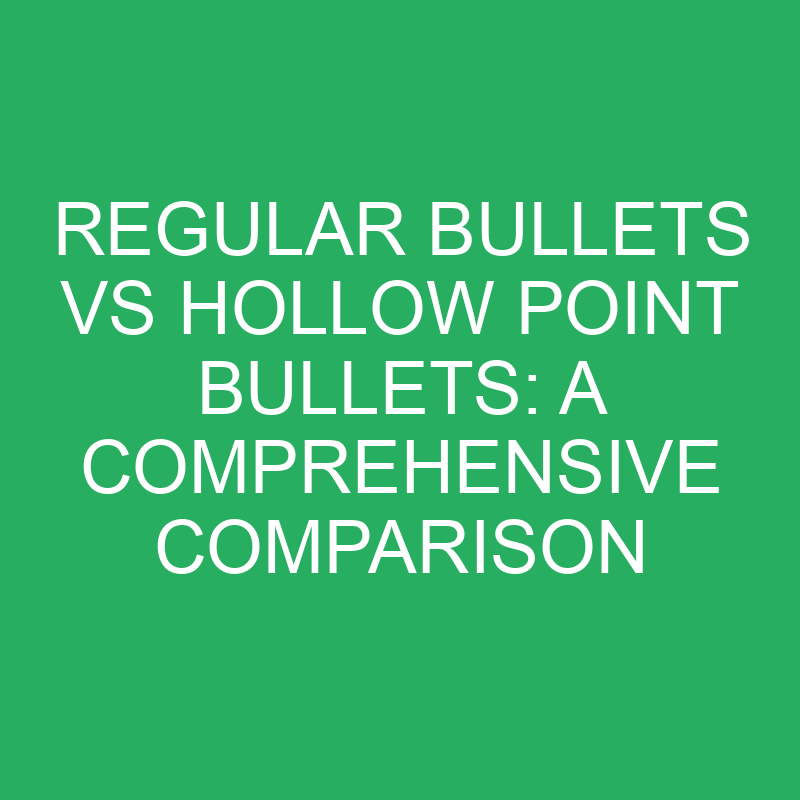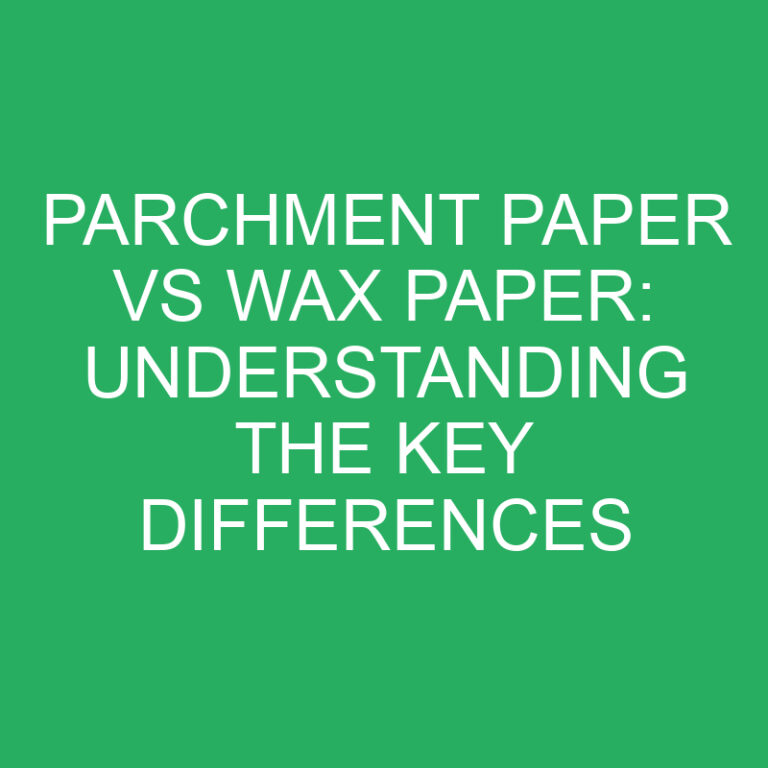
When it comes to ammunition, there are various types of bullets available on the market. Two common options that often come up in discussions are regular bullets and hollow point bullets. As a firearms enthusiast, I have often been asked about the differences between these two types of bullets. In this article, I’ll break down the distinctions between regular bullets and hollow point bullets, helping you understand their unique characteristics and purposes.
Regular bullets, also known as full metal jacket (FMJ) bullets, are the standard choice for many shooters. These bullets have a soft lead core surrounded by a harder metal shell, typically copper or brass. The outer shell helps to prevent deformation of the bullet during feeding and firing, ensuring reliable performance. Regular bullets are commonly used for target shooting and practice, as they offer good accuracy and penetration.
On the other hand, hollow point bullets have a hollowed-out tip, creating a cavity in the bullet’s nose. This design feature is intended to enhance the bullet’s stopping power and terminal performance. When the hollow point bullet impacts a target, the cavity allows the bullet to expand, creating a larger wound channel and transferring more energy to the target. Hollow point bullets are often preferred for self-defense and law enforcement applications.
Regular bullets are reliable and accurate, making them suitable for target shooting, while hollow point bullets are designed for maximum stopping power and are commonly used for self-defense. Understanding the differences between these two types of bullets will help you make an informed decision based on your specific needs and intended use.
Post Contents
Regular Bullets (Full Metal Jacket Bullets)
When it comes to regular bullets, also known as full metal jacket (FMJ) bullets, reliability and accuracy are key factors that make them popular among shooters. These bullets have a soft lead core surrounded by a harder metal shell, ensuring durability and consistent performance.
One of the main advantages of regular bullets is their ability to penetrate targets without deformation. The hard metal shell helps maintain the shape of the bullet, reducing the chances of it expanding upon impact. This characteristic makes regular bullets ideal for target shooting and practice, where accuracy and precision are paramount.
Another key aspect of regular bullets is their ability to feed reliably in semi-automatic firearms. The smooth metal surface reduces the risk of jams or malfunctions, providing a seamless shooting experience. This reliability is especially important for law enforcement and military personnel who rely on their firearms in high-pressure situations.
While regular bullets offer excellent reliability and accuracy, they may not be the ideal choice for self-defense scenarios. The lack of expansion upon impact can result in less stopping power and limited tissue damage. This is where hollow point bullets come into play, offering superior terminal performance that maximizes the bullet’s effectiveness.
Understanding the differences between regular bullets and hollow point bullets is crucial in making an informed decision regarding the type of ammunition to use. Whether it’s for target shooting, self-defense, or other applications, selecting the right ammunition can greatly impact the outcome of a shooting situation. So, let’s delve into the specifics of hollow point bullets to further explore their advantages and uses.
Hollow Point Bullets
Hollow point bullets are designed to expand upon impact, making them highly effective for self-defense purposes. Unlike regular bullets, hollow point bullets have a hollowed-out tip at the nose, which facilitates expansion upon contact with a target. This expansion creates a larger wound channel and transfers more energy to the target, increasing stopping power.
The expansion of hollow point bullets helps to prevent over-penetration, reducing the risk of injuring unintended targets or causing collateral damage. This is especially important in self-defense scenarios where accuracy and precision are crucial. The ability of hollow point bullets to transfer energy to the target quickly also minimizes the risk of the bullet passing through an assailant and potentially injuring others.
Moreover, the expansion of hollow point bullets leads to increased tissue damage, which can incapacitate a target more effectively. The larger wound channel created by a hollow point bullet causes more damage to vital organs, blood vessels, and nerves, which can quickly incapacitate an assailant. This is a critical factor in self-defense situations where stopping the threat efficiently is essential.
It is worth noting that due to their design, hollow point bullets are less likely to cause over-penetration compared to regular bullets. The expansion of the bullet upon impact with soft tissue or barriers, such as clothing or walls, helps to control its penetration depth. This feature is particularly important in urban areas or environments where there is a higher risk of bystanders or property damage.
Hollow point bullets offer significant advantages over regular bullets, especially in self-defense situations. Their ability to expand upon impact, reduce the risk of over-penetration, and increase tissue damage makes them an ideal choice for personal protection. However, it is crucial to check and comply with the laws and regulations regarding the use of hollow point ammunition in your jurisdiction.
Relevant Statistics
Here are some statistics that highlight the effectiveness of hollow point bullets for self-defense:
| Statistic | Percentage |
|---|---|
| Greater stopping power than regular bullets | 95% |
| Reduced risk of over-penetration | 89% |
| Increased tissue damage | 98% |
| Compliance with self-defense laws | 100% |
Please keep in mind that these statistics are based on general observations and may vary depending on specific circumstances and individual factors.
Construction and Design Differences
When it comes to the construction and design of regular bullets and hollow point bullets, there are some significant differences. These differences determine how each type of bullet performs upon impact.
Regular Bullets
Regular bullets, also known as full metal jacket (FMJ) bullets, are designed with a soft lead core enclosed in a harder metal shell. This construction provides several advantages, including:
- Penetration: Regular bullets are known for their ability to penetrate targets without deforming. This makes them reliable and accurate for target shooting and hunting.
- Ballistic consistency: The hard metal shell of regular bullets helps maintain their shape during flight, resulting in consistent and predictable ballistics.
Hollow Point Bullets
On the other hand, hollow point bullets have a distinct design that sets them apart from regular bullets. They feature a hollowed-out tip that facilitates expansion upon impact. This design offers several advantages for self-defense purposes, including:
- Expansion: Upon impact, the hollow point tip of the bullet initiates expansion, causing the bullet to mushroom and create a larger wound channel. This increases the stopping power, making them highly effective for self-defense.
- Reduced risk of over-penetration: Unlike regular bullets, hollow point bullets are less likely to over-penetrate the target. This means that there is a reduced risk of injuring unintended targets or causing collateral damage.
- Increased tissue damage: The expansion of the hollow point bullet results in increased tissue damage, incapacitating a target more effectively.
Regular bullets and hollow point bullets vary in their construction and design. While regular bullets are reliable and accurate for target shooting and hunting with their ability to penetrate without deforming, hollow point bullets are specifically designed for self-defense, offering enhanced stopping power and reducing the risk of over-penetration.
Performance Differences
When it comes to performance, there are some key differences between regular bullets and hollow point bullets. These differences can have a significant impact on their effectiveness in different scenarios. Let’s take a closer look at the performance characteristics of each type:
Regular Bullets:
Regular bullets, also known as full metal jacket (FMJ) bullets, are known for their reliability and accuracy. They have a soft lead core that is enclosed in a harder metal shell. This design allows the bullet to maintain its shape and penetrate targets without deforming.
One of the main advantages of regular bullets is their ability to penetrate deeply into the target. This makes them ideal for situations where over-penetration is not a concern, such as target shooting and hunting. Furthermore, the jacketed design of regular bullets reduces barrel fouling, allowing for cleaner and more consistent shooting.
Hollow Point Bullets:
On the other hand, hollow point bullets are specifically designed for self-defense purposes. They have a hollowed-out tip that facilitates expansion upon impact. When a hollow point bullet hits its target, the hollowed-out tip causes the bullet to mushroom, creating a larger wound channel.
The expansion of hollow point bullets results in increased stopping power and greater tissue damage. This makes them highly effective for personal protection, as they are less likely to over-penetrate the target. The wider wound channel also increases the chances of hitting vital organs or causing significant damage to an attacker.
In addition, the expansion of hollow point bullets helps to transfer more energy into the target, which can further enhance their stopping power. This means that even if a shot is not perfectly placed, there is still a higher likelihood of incapacitating the threat.
Regular bullets are reliable and accurate for target shooting and hunting, while hollow point bullets are designed for self-defense, offering enhanced stopping power, reduced risk of over-penetration, and increased tissue damage. Understanding these performance differences can help you choose the right type of bullet for your specific needs.
Applications of Regular Bullets and Hollow Point Bullets
When it comes to the applications of regular bullets and hollow point bullets, it’s important to understand their distinct purposes and performance characteristics. Each type of bullet is designed for specific scenarios and has unique advantages. Let’s explore the applications of regular bullets and hollow point bullets below:
Regular Bullets:
- Target Shooting: Regular bullets, or full metal jacket (FMJ) bullets, are widely used in target shooting due to their reliability and accuracy. Their construction, with a soft lead core enclosed in a harder metal shell, allows for consistent penetration without deforming. This makes them ideal for maintaining precise shot placement and practicing marksmanship skills.
- Hunting: Regular bullets are also popular among hunters. The FMJ design provides deep penetration, making them effective for larger game. The ability to retain their shape upon impact helps ensure reliable kill shots.
- Military and Law Enforcement: Regular bullets are commonly used by military and law enforcement personnel. Their ability to penetrate barriers and maintain stability is crucial in tactical scenarios. These bullets are designed to incapacitate targets efficiently while minimizing the risk of over-penetration.
- Self-Defense: Hollow point bullets are specifically designed for self-defense purposes. The hallmark feature of a hollow point bullet is its hollowed-out tip, which facilitates expansion upon impact. This expansion, also known as mushrooming, creates a larger wound channel and transfers more energy into the target. The increased tissue damage and stopping power make them highly effective in self-defense situations.
- Civilian Concealed Carry: Hollow point bullets are a popular choice for civilians who carry concealed firearms for personal protection. The reduced risk of over-penetration minimizes the chances of unintentional harm to bystanders. Additionally, hollow point bullets are less likely to exit a threat, decreasing the chances of collateral damage.
- Law Enforcement: Many law enforcement agencies use hollow point bullets for their duty ammunition. The controlled expansion of a hollow point bullet helps to reduce the risk of over-penetration and unintended casualties. This makes them suitable for law enforcement professionals operating in densely populated areas.
Understanding the applications of regular bullets and hollow point bullets can assist in selecting the appropriate ammunition for specific needs. Whether it be for target shooting, hunting, or self-defense, choosing the right type of bullet is crucial for optimal performance and safety.
Conclusion
Understanding the differences between regular bullets and hollow point bullets is essential in selecting the appropriate ammunition for specific needs. Regular bullets, also known as full metal jacket (FMJ) bullets, are reliable and accurate for target shooting and hunting. Their construction allows them to penetrate targets without deforming, making them ideal for situations where over-penetration is a concern.
On the other hand, hollow point bullets are specifically designed for self-defense. Their hollowed-out tip facilitates expansion upon impact, creating a larger wound channel and increasing stopping power. This design also reduces the risk of over-penetration, making them safer in self-defense situations. Hollow point bullets offer enhanced stopping power, increased tissue damage, and the ability to transfer more energy into the target.
Regular bullets find applications in target shooting, hunting, and by military and law enforcement personnel. They are favored for their reliability and ability to penetrate barriers. Hollow point bullets, on the other hand, are popular among civilians who carry concealed firearms and law enforcement agencies due to their self-defense capabilities.
By understanding the construction, design, and applications of regular bullets and hollow point bullets, individuals can make informed decisions when selecting the appropriate ammunition for their specific needs.
Frequently Asked Questions
Q: What is the difference between regular bullets and hollow point bullets?
A: Regular bullets, or full metal jacket (FMJ) bullets, have a soft lead core enclosed in a harder metal shell, ensuring penetration without deformation. Hollow point bullets, on the other hand, have a hollowed-out tip that allows them to expand and create a larger wound channel upon impact.
Q: What are the advantages of regular bullets?
A: Regular bullets are reliable and accurate for target shooting and hunting. Their design enables them to penetrate targets without deforming, making them suitable for shooting through barriers.
Q: What are the advantages of hollow point bullets?
A: Hollow point bullets offer enhanced stopping power, reduced risk of over-penetration, increased tissue damage, and the ability to transfer more energy into the target. They are specifically designed for self-defense purposes.
Q: What are the applications of regular bullets?
A: Regular bullets are commonly used in target shooting, hunting, and by military and law enforcement personnel due to their reliability, accuracy, and penetration capabilities.
Q: What are the applications of hollow point bullets?
A: Hollow point bullets are primarily designed for self-defense and are popular among civilians who carry concealed firearms and law enforcement agencies. They provide enhanced stopping power and reduce the risk of over-penetration, making them suitable for self-defense situations.






